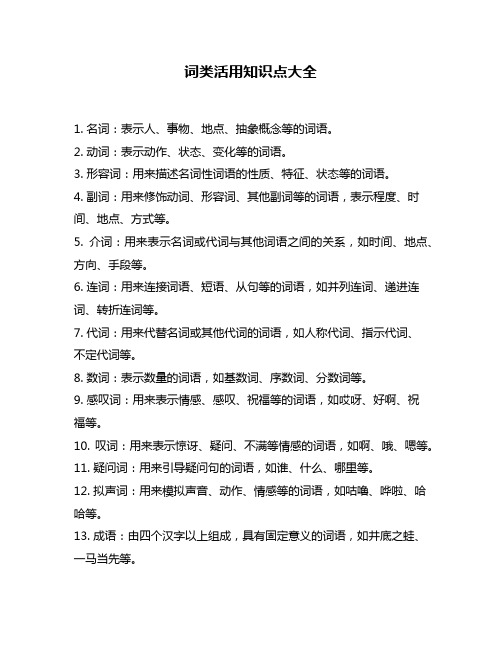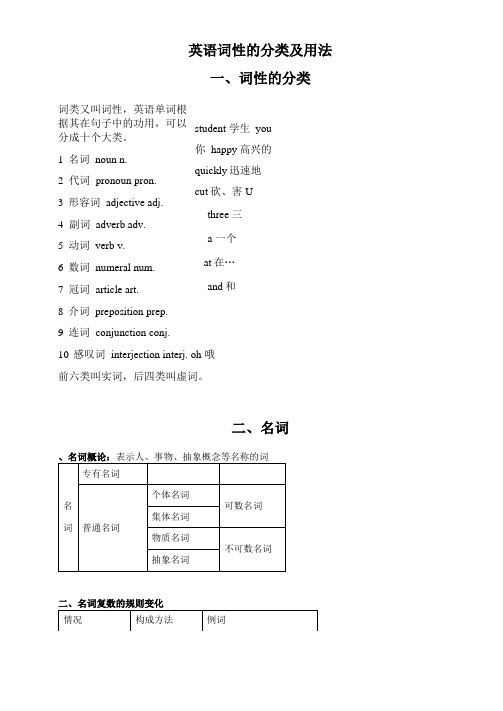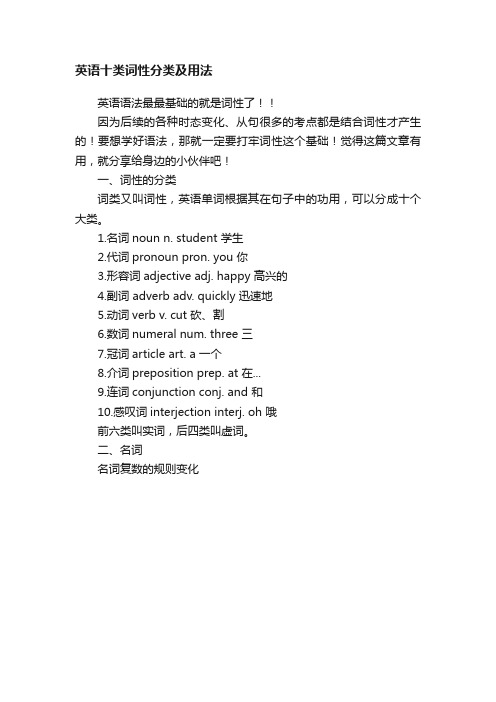英语词性活用
词类活用知识点大全

词类活用知识点大全
1. 名词:表示人、事物、地点、抽象概念等的词语。
2. 动词:表示动作、状态、变化等的词语。
3. 形容词:用来描述名词性词语的性质、特征、状态等的词语。
4. 副词:用来修饰动词、形容词、其他副词等的词语,表示程度、时间、地点、方式等。
5. 介词:用来表示名词或代词与其他词语之间的关系,如时间、地点、方向、手段等。
6. 连词:用来连接词语、短语、从句等的词语,如并列连词、递进连词、转折连词等。
7. 代词:用来代替名词或其他代词的词语,如人称代词、指示代词、
不定代词等。
8. 数词:表示数量的词语,如基数词、序数词、分数词等。
9. 感叹词:用来表示情感、感叹、祝福等的词语,如哎呀、好啊、祝
福等。
10. 叹词:用来表示惊讶、疑问、不满等情感的词语,如啊、哦、嗯等。
11. 疑问词:用来引导疑问句的词语,如谁、什么、哪里等。
12. 拟声词:用来模拟声音、动作、情感等的词语,如咕噜、哗啦、哈哈等。
13. 成语:由四个汉字以上组成,具有固定意义的词语,如井底之蛙、一马当先等。
14. 词组:由两个或两个以上的词语组成的固定搭配,如红红火火、一举两得等。
15. 俚语:在特定社会群体中流行的、具有特殊意义的词语,如装逼、吃瓜群众等。
2021高考英语重点单词词性转换和语境活用11(解析版)

2021高考英语重点单词词性转换和语境活用11解析版基础盘点·自测自评21I.单句语法填空1.Swimming is my favorite (favor) sport. There is nothing like swimming as a means of keeping fit.2.If you come to visit China, you will experience a culture of amazing depth and variety(vary).3And an unexpected (expect) shower added to the difficulty of us in finding a way home, for all the tracks we had made disappeared because of the rain.4.The little boy panicked when thinking about the punishment (punish) he might get from his teacher.5.Students should involve themselves in community activities where they can gain experience for growth (grow).6.The exhibition not only shows a variety of paper cuts in different regions, but also presents to us the history and development (develop)of papercutting in China.7.Body language can give away a lot about your mood, so standing with your arms folded can send out a signal that you are being defensive (defense).munication involves a variety of interactions (interact), which contributes to improving people’s relationship.9.Most colleges now offer first-year students a course specially designed to help them succeed academically (academic) and personally.10.All the sites are free to the public and accessible (access) to anyone with an Internet connection.II.单句改错1.Involving in the car accident, the driver had no alternative but to stay and wait for the policeman.Involving→Involved2.They could photograph almost anything here without requesting permit.permit→permission3.All the tickets sold out, they went away, disappointing. disappointing→disappointed4.The hotel is convenient located close to the beach, thus making it popular among tourists. convenient→conveniently5.It is very worth making an effort to promote the public awareness of environmental protection.very→wellIII.短文语法填空For the first time in 94 years, the Palace Museum has extended its opening hours, allowing the public to celebrate the Lantern Festival at night in the ancient palace.About 3,000 lucky visitors received free tickets from the government, among 1._______ was Zhang Zhifu, a 77yearold public security volunteer. It’s a mark of gratitude for her volunteer work.“It is 2._______(true) an honorto be granted this special privilege,”Zhang said.To guarantee the 3._______(safe) of the palace, festival organizers 4._______(plan) this year’s Lantern Festival event used LED lights rather than traditional paper lanterns and red candles. It’s a fascinating event for visitors to absorb 5._______(they) in the festive atmosphere in the museum. Discussion of the Palace Museum’s new look lit up social media following Tuesday’s display.Since he became director of the Palace Museum, Shan Jixiang 6._______(bring) many changes to the world’s7._______(large) imperial complex(建筑群). Once in a speech Shan shared his idea about how to make traditional8._______(treasure) come alive again. He said, “9._______ matters to a museum is not how many visitors they have, but how close they are 10._______ people’s daily lives.”【解题导语】本文是一篇说明文。
2021高考英语重点单词词性转换和语境活用03(解析版)

2021高考英语重点单词词性转换和语境活用03解析版基础盘点·自测自评05对接高考·重点单词词性转换高效演练五I.单句语法填空1.Jane moved aimlessly (aim) down the treelined street, not knowing where she was heading.2.People have learnt the importance of keeping a balanced (balance) diet to satisfy their nutritional needs.3.Supposing/Suppose(suppose) that there was an earthquake, what would be the right way to escape?4.The government is supposed to take effective (effect) measures to protect the environment.5.I wanted to know how the students reacted to my words as well as your reaction (react).6.I soon came to the conclusion (conclude) that he could not afford to buy a house.7. —Would you like to drink some coffee with some sugar or milk?—Oh,I’d like some milk added (add) to the coffee.8.It is uncertain (certain)whether he can come to Jenny’s birthday party or not.9.The more you listen to English, the easier (easy) you’ll feel in speaking English.10.When it comes to adaptation (adapt) , it is important to understand that climate change is a process.Ⅱ单句改错1.Hearing that our country has successfully launched Shenzhou XIspaceship, we offered our congratulation.congratulation→congratulations2.Although astonishing at what he heard, Peter didn’t say anything. astonishing→astonished3.Our school has been given some new teaching equipments since 2019. equipments→equipment4.The apartments are so expensive that they are hard for ordinarily people to buy. ordinarily→ordinary5.I can’t tell you how delighting I was with the beautiful birthday present you gave me. delighting→delightedIII.短文语法填空A report says about fifty million to seventy million Americans have sleep problems. It says many more are suffering from lack of sleep.A study has examined 1. we need sleep and the effects of sleep loss. The study shows American businesses lose millions of dollars a year because of tired workers. Some 2. (employ) are too tired to report for work. They have more accidents or are 3. (little) productive at work. Other costs include increased visits 4. doctors.The study finds that 20% of injuries 5. (cause) by car accidents are linked to sleepy drivers. Other studies have linked poor sleep to a risk of health problems like heart disease, depression and 6. (healthy) amounts of body fat. Researchers say the reason for this link is unclear.Many experts say 7. large amount of sleep is as important to health as diet and exercise. They say most people need seven to nine hours of sleep each night. Less than that can influence 8. mental and physical abilities. It can lead to more serious problems, including severe sleeplessness. People with this condition temporarily stop 9. (breathe) while they sleep.Researchers suggest the public 10. (inform) of the problem and take steps to prevent sleep disorders.【解题导语】充足的睡眠同饮食和健康一样重要。
英语词性的分类及用法

英语词性的分类及用法一、词性的分类词类又叫词性,英语单词根据其在句子中的功用,可以分成十个大类。
1 名词 noun n.2 代词 pronoun pron.3 形容词 adjective adj.4 副词 adverb adv.5 动词 verb v.6 数词 numeral num.7 冠词 article art.8 介词 preposition prep.9 连词 conjunction conj.10 感叹词 interjection interj. oh 哦 前六类叫实词,后四类叫虚词。
二、名词student 学生 you 你 happy 高兴的quickly 迅速地cut 砍、害Uthree 三a 一个at 在… and 和三、其它名词复数的规则变化1)以y结尾的专有名词,或元音字母+y结尾的名词变复数时,直接加s变复数:如:the Henrys monkey---monkeys holiday-holidays2)以o结尾的名词,变复数时:a.力口s,如:photo---photos piano---pianos radio-radios zoo---zoos;b.力口es,如:potato—potatoes tomato—tomatoes3)以f或fe结尾的名词变复数时:a.力口s,如:belief-beliefs roof---roofssafe-safesb.去f, fe加-ves (妻见小偷架下藏,手拿小刀想杀狼;谁知落下半片叶,砸在头上一命亡)half--halves leaf-leaves life-lives四、名词复数的不规则变化1 )child-children foot---feet tooth---teeth mouse-mice man---menwoman-women2)单复同形如:deer,sheep,fish,Chinese,Japanese3)集体名词,以单数形式出现,但实为复数。
词类活用6大类型及例子

词类活用6大类型及例子词类活用是指词汇在句子中根据语法功能的不同而发生的变化。
根据不同的语法功能,词汇可以分为名词、动词、形容词、副词、代词和介词六大类。
下面将分别介绍这六类词的活用类型,并且给出相应的例子。
一、名词(Noun)的活用类型:1. 单数形式(Singular form):表示一个人、物或概念,如:book (书)、dog(狗)、love(爱)。
2. 复数形式(Plural form):表示多个人、物或概念,如:books (书籍)、dogs(狗)、loves(爱)。
3. 所有格形式(Possessive form):表示所有权关系,如:book's (书的)、dogs'(狗的)、love's(爱的)。
二、动词(Verb)的活用类型:1. 一般现在时(Simple Present Tense):表示经常性的或普遍性的动作或状态,如:I play(我玩)、He eats(他吃)、They dance (他们跳舞)。
2. 一般过去时(Simple Past Tense):表示过去发生的动作或状态,如:I played(我玩过)、He ate(他吃过)、They danced(他们跳过)。
3. 现在进行时(Present Continuous Tense):表示现在正在进行的动作,如:I am playing(我正在玩)、He is eating(他正在吃)、They are dancing(他们正在跳舞)。
4. 过去进行时(Past Continuous Tense):表示过去某一时刻正在进行的动作,如:I was playing(我当时正在玩)、He was eating (他当时正在吃)、They were dancing(他们当时正在跳舞)。
5. 一般将来时(Simple Future Tense):表示将来要发生的动作或状态,如:I will play(我将要玩)、He will eat(他将要吃)、They will dance(他们将要跳舞)。
英语十类词性分类及用法

英语十类词性分类及用法英语语法最最基础的就是词性了!!因为后续的各种时态变化、从句很多的考点都是结合词性才产生的!要想学好语法,那就一定要打牢词性这个基础!觉得这篇文章有用,就分享给身边的小伙伴吧!一、词性的分类词类又叫词性,英语单词根据其在句子中的功用,可以分成十个大类。
1.名词noun n. student 学生2.代词pronoun pron. you 你3.形容词adjective adj. happy 高兴的4.副词 adverb adv. quickly 迅速地5.动词verb v. cut 砍、割6.数词numeral num. three 三7.冠词article art. a 一个8.介词preposition prep. at 在...9.连词conjunction conj. and 和10.感叹词interjection interj. oh 哦前六类叫实词,后四类叫虚词。
二、名词名词复数的规则变化名词的格在英语中有些名词可以加“'s”来表示所有关系,带这种词尾的名词形式称为该名词的所有格,如:a teacher’s book。
名词所有格的规则如下:1)单数名词词尾加“'s”,复数名词词尾没有s,也要加“'s”,如the boy's bag 男孩的书包,men’s room 男厕所。
2)若名词已有复数词尾-s ,只加“'”,如:the workers’ struggle工人的斗争。
三、代词大多数代词具有名词和形容词的功能。
英语中的代词,按其意义、特征及在句中的作用分为:人称代词、物主代词、指示代词、反身代词、相互代词、疑问代词、关系代词、连接代词和不定代词九种人称代词的用法:I saw her with them, at least, I thought it was her.我看到她和他们在一起,至少我认为是她。
(her做宾语,them做介词宾语,her作主补)a. -- Who broke the vase?--谁打碎了花瓶?b. -- Me.--我。
词类活用知识点总结

词类活用知识点总结在语法中,词类活用是指词汇的不同形式在句子中所扮演的不同角色。
在英语中,存在名词、动词、形容词、副词、代词、连词和介词等不同的词类,它们在句子中扮演不同的语法角色。
以下是词类活用的知识点总结:名词名词是指人、事、物、地点和概念的名称。
在句子中,名词可以担任主语、宾语、表语和定语等不同的语法位置。
名词的单数和复数形式、所有格形式以及不同的分类形式都是名词的活用形式。
动词动词是表示动作、状态或者变化的词汇,它在句子中可以担任谓语、宾语补足语等不同的语法位置。
动词的时态、语态、语气、人称和数等形式都是动词的活用形式。
形容词形容词是表示人或事物的性质、特征或状态的词汇,它在句子中可以作为定语、表语等不同的语法位置。
形容词的比较级和最高级形式是形容词的活用形式,它们用来表示事物之间的程度或者比较。
副词副词是修饰动词、形容词、副词或整个句子的词汇,它在句子中可以作状语、宾补等不同的语法位置。
副词的比较级和最高级形式是副词的活用形式,它们用来表示程度或者比较。
代词代词是用来代替名词或者名词短语的词汇,它在句子中可以作主语、宾语、表语等不同的语法位置。
代词的人称、数和格等形式是代词的活用形式,它们用来表示代词在句子中的不同角色。
连词连词是用来连接词、词组或句子的词汇,它在句子中起连接作用。
连词的不同种类和用法是它的活用形式,它们用来表示逻辑关系和语法连接。
介词介词是用来表示事物之间的关系或位置的词汇,它在句子中可以作状语、宾语等不同的语法位置。
介词的不同种类和用法是它的活用形式,它们用来表示不同的空间或时间关系。
总结词类活用是语法中非常重要的知识点,它涉及到词汇的不同形式在句子中所扮演的不同角色。
掌握词类活用的知识能够帮助我们正确理解句子的结构和含义,提高我们的语言表达能力。
因此,我们在学习和使用语言的过程中,要注重词类活用的练习和应用,从而提高我们对语言的认知和运用能力。
2021高考英语重点单词词性转换和语境活用17(解析版)

2021高考英语重点单词词性转换和语境活用17解析版基础盘点·自测自评33对接高考·重点单词词性转换高效演练33Ⅰ.单句语法填空1.It is with great regret that I tell you I can’t go to the book store with you at the appointed (appoint) time.2.People fled aimlessly (aimless) in terror as the tsunami struck the city without any precaution.3.It’s ashamed (shame) of him to have got so much help from others but give nothing to society in return.4.The manager says he needs an assistant that he can count on to deal with the problems that may occur in his absence (absent).rge amounts of agricultural (agriculture) technology are needed by the farmers.6.A man immediately rushed to the girl to give her first aid and I joined in without hesitation (hesitate).7.In this instance, the best solution is to send a quick, lighthearted apology (apologise) to explain your awkwardness.8.Each week I eagerly counted my growing savings (save) increased by extra work here and there.9.Jerry did not regret having given the comment but felt that he could have expressed it differently (different).10.The boy is good at advanced (advance) mathematics, not to mention such an easy problem.Ⅰ.单句改错1.Lucy is a shy girl, but can you imagine her quarrel with the boss in Japanese?quarrel→quarreling2.Hearing the funny story, all the people present burst into laughing.laughing→laughter3.All the workers belonged to the factory must obey the rule.belonged→belonging4.Health problems are close connected with bad eating habits and a lack of exercise.close→closely5.The woman managed to escape from the fire with her baby, extremely terrified and exhausting.exhausting→exhaustedIII.短文语法填空Throughout history people have worn clothing of one description or another. Apart 1.____________ protection against the weather, clothes were also often used 2.____________(show) the wearer’s status and wealth. Over theyears, many fashions in clothing have come and gone. While some of these have been popular for relatively short 3.____________(period), others have lasted longer.Until the first half of the 20th century, the ability to follow fashion was limited to those 4.____________ had the money to do so. But following fashion did not only demand money, it also required large amounts of time. Wealthy people took fashion very 5.____________(serious) and close attention had to 6.____________(pay) to details. Wearing the correct clothes for different occasions 7.____________(be) very important, despite the fact that this often meant 8.____________(change) clothes five or six times a day.More recently, fashionable clothes have come within the reach of ordinary people. The 9.____________(tradition) methods of dressmaking, which usually involved sewing by hand, were both costly and slow. But today’s clothing industry has made 10.____________ easier for people to keep up with changes in fashion without having to spend a great amount of money.【解题导语】本文介绍了时尚服装由最初的仅在有钱人中盛行到逐步进入普通人的生活的发展历程。
- 1、下载文档前请自行甄别文档内容的完整性,平台不提供额外的编辑、内容补充、找答案等附加服务。
- 2、"仅部分预览"的文档,不可在线预览部分如存在完整性等问题,可反馈申请退款(可完整预览的文档不适用该条件!)。
- 3、如文档侵犯您的权益,请联系客服反馈,我们会尽快为您处理(人工客服工作时间:9:00-18:30)。
思路分析]我把英语语句基本结构给你讲一下[解题过程]>> 主谓宾结构:主语:可以作主语的成分有名词(如boy),主格代词(如you),动词不定式,动名词等。
主语一般在句首。
注意名词单数形式常和冠词不分家!谓语:谓语由动词构成,是英语时态、语态变化的主角,一般在主语之后。
不及物动词(vi.)没有宾语,形成主谓结构,如:We come.宾语:宾语位于及物动词之后,一般同主语构成一样,不同的是构成宾语的代词必须是‘代词宾格’,如:me,him,them等例:The boy needs a pen.主语the boy,谓语needs(need的第三人称单数形式),宾语a pen.>> 主系表结构:主语:同‘主谓宾’结构。
联系动词(Link verb):be动词(am,is,are,was,were,have been);其他联系动词如:become成为,turn变成,go变。
其特点是联系动词与其后的表语没有动宾关系,表语多为形容词或副词,既,不可能是宾语。
表语:说明主语的状态、性质、等。
可为形容词、副词、名词、代词、不定式、分词。
当联系动词不是be,而其后是名词和代词时,多表达‘转变为’之意,注意与动宾关系的区别。
感官动词多可用作联系动词:look well/面色好,sound nice/听起来不错,feel good/感觉好,smell bad/难闻例:Tom is a boy.(Tom是个男孩)/主语为Tom,系词为be动词的第三人称单数is,表语为a boy>> There be 结构:There be 表示‘存在有’。
这里的there没有实际意义,不可与副词‘there那里’混淆。
此结构后跟名词,表示‘(存在)有某事物’试比较:There is a boy there.(那儿有一个男孩。
)/前一个there无实意,后一个there为副词‘那里’。
二、定语:定语是对名词或代词起修饰、限定作用的词、短语或句子,汉语中常用‘……的’表示。
返回定语通常位于被修饰的成分前。
若修饰some,any,every,no构成的复合不定代词时,(如:something、nothing);或不定式、分词短语作定语、从句作定语时,则定语通常置后。
副词用作定语时须放在名词之后。
形容词作定语:The little boy needs a blue pen.(little修饰名词boy;blue修饰名词pen.)/小男孩需要一支兰色的钢笔。
Tom is a handsome boy./Tom是个英俊的男孩。
There is a good boy./有个乖男孩。
数词作定语相当于形容词:Two boys need two pens./两个男孩需要两支钢笔。
The two boys are students./这两个男孩是学生。
There are two boys in the room./房间里有两个男孩。
代词或名词所有格作定语:His boy needs Tom\'s pen./他的男孩需要Tom的钢笔。
His name is Tom./他的名字是汤姆。
There are two boys of Toms there./那儿有Tom家的两个男孩。
介词短语作定语:The boy in the classroom needs a pen of yours./教室里的男孩需要你的一支钢笔。
The boy in blue is Tom./穿兰色衣服的孩子是汤姆。
There are two boys of 9,and three of 10./有两个9岁的,三个10岁的男孩。
名词作定语:The boy needs a ball pen./男孩需要一支圆珠笔。
It is a ball pen./这是一支圆珠笔。
There is only one ball pen in the pencil box./这铅笔盒里只有一支圆珠笔。
副词作定语:The boy there needs a pen./那儿的男孩需要一支钢笔。
The best boy here is Tom./这里最棒的男孩是Tom。
不定式作定语:The boy to write this letter needs a pen./写这封信的男孩需要一支钢笔。
The boy to write this letter is Tom./将要写这封信的男孩是汤姆。
There is nothing to do today./今天无事要做。
分词(短语)作定语:The smiling boy needs a pen bought by his mother./那个微笑的男孩需要一支他妈妈买的钢笔。
The pen bought by her is made in China./她买的笔是中国产的。
There are five boys left./有五个留下的男孩。
定语从句:The boy who is reading needs the pen which you bought yesterday./那个在阅读的男孩需要你昨天买的钢笔。
The boy you will know is Tom./你将认识的男孩叫汤姆。
There are five boys who will play the game./参加游戏的男孩有五个。
三、状语:状语修饰动词、形容词、副词或全句,说明方式、因果、条件、时间、地点、让步、方向、程度、目的等。
返回状语在句子中的位置很灵活,常见情况为:通常在句子基本结构之后,强调时放在句首;修饰形容词或副词时,通常位于被修饰的词之前;表示时间、地点、目的的状语一般位于句子两头,强调时放在句首,地点状语一般须在时间状语之前;一些表示不确定时间(如:often)或程度(如:almost)的副词状语通常位于be动词、助动词、情态动词之后,动词之前。
有时状语在句中的某个位置会引起歧义,应注意,如:The boy calls the girl in the classroom.一般理解成‘男孩喊教室里的女孩‘(此时in the classroom为girl的定语),也可以理解为‘男孩在教室里喊女孩’(此时in the classroom为地点状语),最好写作‘In the classroom,the boy calls the girl.\'副词(短语)作状语:The boy needs a pen very much./男孩非常需要一支钢笔。
(程度状语)The boy needs very much the pen bought by his mother./男孩非常需要他母亲买的那支钢笔。
(宾语较长则状语前置)The boy really needs a pen./男孩真的需要一支钢笔。
(程度状语)The boy needs a pen now./Now,the boy needs a pen./The boy,now,nee ds a pen./男孩现在需要一支钢笔。
(时间状语)介词短语作状语:In the classroom,the boy needs a pen./在教室里,男孩需要一支钢笔。
(地点状语)Before his mother,Tom is always a boy./在母亲面前,汤姆总是一个男孩子.(条件状语)On Sundays,there is no student in the classroom./星期天,教室里没有学生.(时间状语)分词(短语)作状语:He sits there,asking for a pen./他坐在那儿要一支笔。
(表示伴随状态)Having to finish his homework,the boy needs a pen./因为不得不完成作业,男孩需要一支笔。
(原因状语)Frightened,he sits there soundlessly./(因为)受了惊吓,他无声地坐在那儿。
(原因状语)不定式作状语:The boy needs a pen to do his homework./男孩需要一支笔写家庭作业。
(目的状语)To make his dream come true,Tom becomes very interested in busine ss./为实现梦想,汤姆变得对商业很有兴趣.名词作状语:Come this way!/走这条路!(方向状语)状语从句:时间状语从句地点状语从句原因状语从句结果状语从句目的状语从句比较状语从句让步状语从句条件状语从句四、直接宾语和间接宾语:返回>>>特殊的同源宾语现象: fight a fight , dream a dream , etc.有些及物动词可以有两个宾语,如:give给,pass递,bring带,show 显示。
这两个宾语通常一个指人,为间接宾语;一个指物,为直接宾语。
间接宾语一般位于直接宾语之前。
一般的顺序为:动词 + 间接宾语 + 直接宾语。
如:Give me a cup of tea,please.强调间接宾语顺序为:动词 + 直接宾语 + to + 间接宾语。
如:Show this house to Mr.Smith.若直接宾语为人称代词:动词+ 代词直接宾语 + to + 间接宾语。
如:Bring it to me,please.五、宾语补足语:位于宾语之后对宾语作出说明的成分。
宾语与其补足语有逻辑上的主谓关系,它们一起构成复合宾语。
返回名词/代词宾格 + 名词The war made him a soldier./战争使他成为一名战士.名词/代词宾格 + 形容词New methods make the job easy./新方法使这项工作变得轻松.名词/代词宾格 + 介词短语I often find him at work./我经常发现他在工作.名词/代词宾格 + 动词不定式The teacher ask the students to close the windows./老师让学生们关上窗户.名词/代词宾格 + 分词I saw a cat running across the road./我看见一只猫跑过了马路.六、同位语:返回同位语是在名词或代词之后并列名词或代词对前者加以说明的成分,近乎于后置定语。
如:We students should study hard. / (students是we的同位语,都是指同一批‘学生’)We all are students. / (all是we的同位语,都指同样的‘我们’)七、独立成分:有时句子中会有一些与句子没有语法联系的成分,称为句子独立成分(注意:区别于分词独立结构)。
